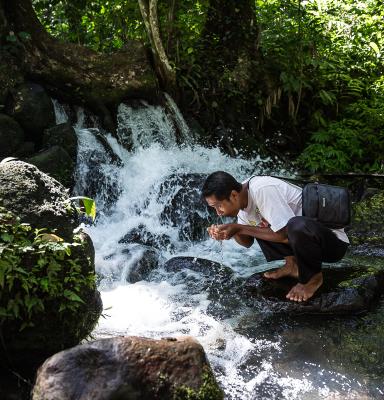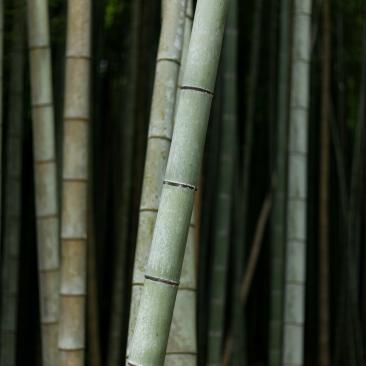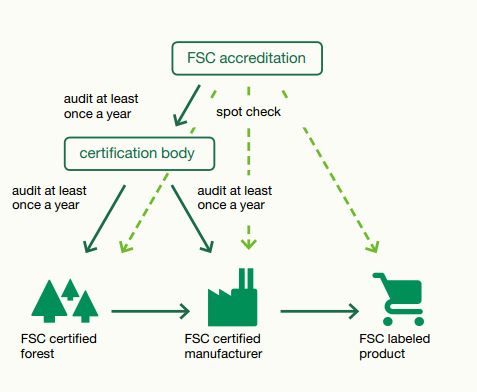

Forests and FSC in Asia Pacific
The forests of Asia Pacific are also a lifeline for millions of people – forests are the main contributor to the national wealth of several nations. The estimated annual value of the primary forest product trade in Asia Pacific exceeds US$90 billion. But there is also a dark side: deforestation and forest degradation are accelerating due to factors like an increased demand for forest resources, clearing for agriculture, unsustainable logging, the impacts of climate change, and forest fires linked to farming, plantations and palm oil development.
Sustainable and responsible forest management is desperately needed to turn the situation around.
FSC Asia Pacific – An Overview
FSC has been active in Asia Pacific since the early 2000s. The FSC Asia Pacific Regional Office (APRO) was established in Hong Kong in 2011, aiming to accelerate our mission to balance environmental, social and economic interests and drive responsible forest stewardship.
Today, FSC has one regional office, four national offices in China, Australia, Malaysia, and Japan, and representatives based in India, Indonesia, Korea, New Zealand, Thailand, and Vietnam.
We have a strong and growing presence across Asia Pacific, augmented by our network of nearly 10,000 certified businesses, key retailers, our diverse membership, and our NGO partners including WWF, The Borneo Initiative, RECOFTC, The Rainforest Alliance, and Forest Sustainability (Malaysia).

Matching sustainable forest product demand and supply
As the world’s most populated region and home to its fastest-growing economies, it is crucial that development in Asia Pacific move in a sustainable direction.
For the past nine years, FSC Asia Pacific has been working to increase market demand for sustainable timber and encourage a matching level of supply from within and outside the region.
Our work is creating lasting impacts – from multi-billion dollar businesses committing to only source socially- and environmentally-responsible FSC-certified materials and products; to institutional investors providing assurance that through FSC, their forestry assets are managed to world-class standards; to local community forests gaining access to multinational companies and global supply chains through FSC group certification.
These successes continue to reinforce that FSC can provide high-level assurance to community organisations, investors, boards of directors, governments, and other entities so as to facilitate and unleash the enormous market potential of sustainable forestry.
The number of businesses receiving our chain of custody (CoC) certificates has been growing steadily Asia Pacific. China now has more than 4,000 certificates – the highest number of any country in the world.
FSC actively engages in dialogue on new and emerging forest product trade initiatives and topics in the region, such as natural rubber and the use of viscose for fabrics and clothing. We also support smallholders as they seek to gain better access to green and ethical markets.
Importantly, FSC is actively driving market solutions in the growing area of ecosystem services, where the responsible management of carbon, water, biodiversity, and recreational assets is rewarded and additional revenue potential is created to drive further responsible forest management incentives.
Highlights of FSC in Asia Pacific
- Kirin Group, one of the largest beverage groups in Japan, has committed to 100% FSC-certified paper packaging. By the end of 2020, Kirin was using 100% FSC-certified paper in all paper containers used by Kirin Holdings’ beverage business in Japan. This is now being expanded to all Kirin Group companies, including overseas subsidiaries.
- Avery Dennison, a global manufacturer of adhesive labels, has committed to sourcing 100% certified paper by 2025, of which 70% will be certified by FSC.
- Vitasoy International Holdings Limited, a renowned household beverage brand from Hong Kong, remains committed to increasing the percentage of fresh-keeping laminated FSC-certified paper packaging to 90%.
Success on the global market
- TetraPak, a global food packaging company, ensures that 100% of the paperboard in their packages comes from FSC-certified forests and other controlled sources, and that 100% of the packs they produce are eligible to carry the FSC label.
- Kimberly-Clark prefers FSC for its sustainable forest products sourcing. FSC has partnered with the company since 2007, helping to use consumer power to end deforestation and safeguard forest ecosystems.
- The LEGO Group is committed to using only FSC-certified paper and cardboard, with approximately 75% of cardboard used to make LEGO boxes coming from recycled material, while all paper and cardboard used in products and product packaging is recyclable, sustainably sourced and FSC-certified.
- IKEA has a long-term goal to source all wood for IKEA products from certified and responsibly-managed forests. At the end of 2020, more than 98% of the wood used for IKEA products was either FSC-certified or recycled.
Ensuring our integrity
FSC is a trust mark. The assurance we provide comes from our internationally-consistent set of forest management standards and the numerous social and environmental NGOs that support us around the world.
The scale and diversity of the multinational, national and retail businesses that actively use FSC products and materials are key indicators of the trust that is consistently placed in FSC’s global certification system.

Trust in FSC’s systems is founded in how standards are collaboratively set, and how certification is awarded and maintained. To maintain FSC certification, companies are audited by their certification bodies at least once a year and are subject to spot checks by the independent accreditation body Accreditation Services International (ASI) – an organisation that offers international accreditation to certification bodies wishing to audit against voluntary sustainability standards around the world.
We also have an established a dispute resolution system that supports stakeholders who want to express concerns about the operation of the FSC system, and determines the best way to resolve disputes – be they a complaint against a Certificate Holder, a Certification Body, or FSC itself**.
** Please note that any complaint about a certified organisation which has not been referred to the relevant certification body for resolution will be directed to the Certification Body and not handled by FSC.